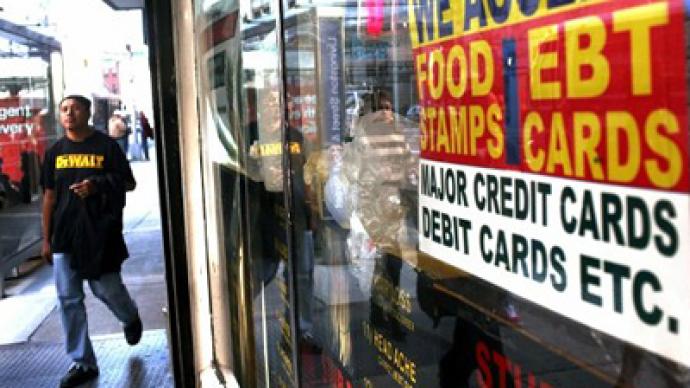America becomes a food stamp nation

You don’t have to dig deep to see the results of the financial crisis of '07. With the aftermath still evident as the US skirts the brims of recession, here is yet another example of economic collapse: 15 percent of Americans are using food stamps.
More than 45 million Americans, or 15 percent of the population, use government-subsidized food stamps to feed their family today, signaling an increase of 74 percent since 2007. A recent report by Reuters reveals that in 2010, $68 billion went towards the program, which is leaving lawmakers looking towards benefits like these as a way to save pennies and cents from coast-to-coast. It’s not just the hungry that are in need of a hand-out, however. Social Security benefit claims have climbed to a high too, showing a surge of 50 percent since ten years earlier. Combined with mass unemployment, aging baby boomers reaching retirement age and a tremendous tally of those that just can’t work, Americans are looking for assistance more than ever; but how long can the country continue to help?The Associated Press reveals that estimates from Congress suggest that the funds for Social Security disability benefits will be dried up by 2017. By 2040 the money that pays for Social Security retirement checks will be gone, as well. At this rate, Americans don’t stand to achieve assistance in a generation down the road, but Republican lawmakers looking to eliminate entitlement programs as a way of combating the disastrous debt the country has accumulated may bring that end to a time much sooner than Americans anticipate. Under today’s regulations, Social Security benefits for retirees come into play at age 66, though those younger can reap in revenue for qualifying for disability at a much earlier age. Social Security Commissioner Michael Astrue says that many too young for retirement reach out for those disability rewards due to dire times when employment seems out of the question."It's primarily economic desperation," Astrue says to AP. "People on the margins who get bad news in terms of a layoff and have no other place to go and they take a shot at disability.”Of those that can find work, it is often not enough to raise a family. More than 70 million Americans received minimum wage or lower as workplace compensation in 2010, tallying up to 6 percent of the US population. A few years before the recession, that figure was only at 3 percent of America. Tashawana Green from Queens Village, New York tells Reuters that she was working for barely $8/hour to support her six-year-old daughter, and though food stamps helped her through hardships, the country shouldn’t be expected to foot the bill when employers can’t."It's a good thing that the government helps, but if employers paid enough and gave enough hours, then we wouldn't need to be on food stamps," says Green, who told Reuters she worked an average of 25 hours a week at a Target retail store. Another user of government assistance tells Reuters that she had to swallow her pride to go on food stamps, saying that she had to do what was best for her daughter. "I felt the way our national debt was going I didn't want to be part of the problem," says Jessica King of Portland, “but I didn't know what else to do.”More and more Americans are being faced with the same problem, but as the country’s collection plate is emptying out, many might have nowhere to turn in a few years’ time.














